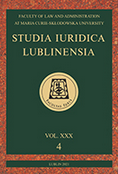Systemic Position of the Notary under the First Polish Law on Notaries of 27 October 1933. Part Two
Systemic Position of the Notary under the First Polish Law on Notaries of 27 October 1933. Part Two
Author(s): Tomasz WośSubject(s): History of Law, Civil Law, Interwar Period (1920 - 1939)
Published by: Wydawnictwo Naukowe Uniwersytetu Marii Curie-Sklodowskiej
Keywords: notary; system of notaries; systemic position; public functionary; person of public trust;
Summary/Abstract: The article addresses the notary’s systemic position under the first Polish Law on Notaries of 27 October 1933. The analysis of the position of the notary carried out in part one of this article pointed to serious difficulties in the precise defining of this position, both among the scholars in the field and the judicature. To precisely define the systemic position of the notary, part two has provided an analysis of the provisions of the Law on Notaries regarding the professional self-government of notaries, supervision over notaries and their activities, disciplinary liability and compensatory liability of the notary, and the rules of preparation for the profession of notary. The analysis of the Law on Notaries of 1933 presented in the first and second part of this article, leads to the conclusion that the notary’s position included in its legal position a combination of features of a public officer and a liberal profession. The legislature, using in Article 1 the term “public functionary”, and not “state official”, and giving notaries in Article 23 of the Law on Notaries the legal protection enjoyed by state officials, wanted to clearly emphasize the existing differences between them while at the same time underlining their close relationship to the state. The adoption of such a definition made it possible to grant notaries a wide range of powers. At the same time, it provided the basis to establish a professional self-government and entrust its bodies with significant powers in the area of disciplinary jurisdiction. The dualistic approach to the position of the notary was also reflected in the separate rules of training for the profession and in the special rules of notary’s liability for damages. The state, by entrusting notaries with activities related to non-contentious judiciary, secured for itself an exclusive influence on the staffing of notary positions and covered the system of notaries by a strict supervision exercised by the Minister of Justice. The discussion presented in the article leads to a conclusion that the legislature approached the position of a notary in the Law on Notaries of 1933 in a special way, creating a combination of official and professional elements, which can be called a public function. In terms of the political and administrative system, regardless of the definition itself, the notary in practice performed the function of a person of public trust.
Journal: Studia Iuridica Lublinensia
- Issue Year: 30/2021
- Issue No: 4
- Page Range: 573-592
- Page Count: 20
- Language: English

